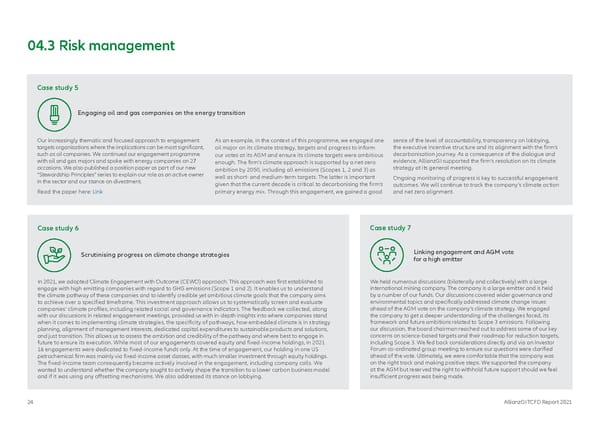04.3 Risk management Case study 5 Engaging oil and gas companies on the energy transition Our increasingly thematic and focused approach to engagement As an example, in the context of this programme, we engaged one sense of the level of accountability, transparency on lobbying, targets organisations where the implications can be most significant, oil major on its climate strategy, targets and progress to inform the executive incentive structure and its alignment with the firm’s such as oil companies. We continued our engagement programme our votes at its AGM and ensure its climate targets were ambitious decarbonisation journey. As a consequence of the dialogue and with oil and gas majors and spoke with energy companies on 27 enough. The firm’s climate approach is supported by a net-zero evidence, AllianzGI supported the firm’s resolution on its climate occasions. We also published a position paper as part of our new ambition by 2050, including all emissions (Scopes 1, 2 and 3) as strategy at its general meeting. “Stewardship Principles” series to explain our role as an active owner well as short- and medium-term targets. The latter is important Ongoing monitoring of progress is key to successful engagement in the sector and our stance on divestment. given that the current decade is critical to decarbonising the firm’s outcomes. We will continue to track the company’s climate action Read the paper here: Link primary energy mix. Through this engagement, we gained a good and net zero alignment. Case study 6 Case study 7 Scrutinising progress on climate change strategies Linking engagement and AGM vote for a high emitter In 2021, we adopted Climate Engagement with Outcome (CEWO) approach. This approach was first established to We held numerous discussions (bilaterally and collectively) with a large engage with high emitting companies with regard to GHG emissions (Scope 1 and 2). It enables us to understand international mining company. The company is a large emitter and is held the climate pathway of these companies and to identify credible yet ambitious climate goals that the company aims by a number of our funds. Our discussions covered wider governance and to achieve over a specified timeframe. This investment approach allows us to systematically screen and evaluate environmental topics and specifically addressed climate change issues companies’ climate profiles, including related social and governance indicators. The feedback we collected, along ahead of the AGM vote on the company’s climate strategy. We engaged with our discussions in related engagement meetings, provided us with in-depth insights into where companies stand the company to get a deeper understanding of the challenges faced, its when it comes to implementing climate strategies, the specificity of pathways, how embedded climate is in strategy framework and future ambitions related to Scope 3 emissions. Following planning, alignment of management interests, dedicated capital expenditures to sustainable products and solutions, our discussion, the board chairman reached out to address some of our key and just transition. This allows us to assess the ambition and credibility of the pathway and where best to engage in concerns on science-based targets and their roadmap for reduction targets, future to ensure its execution. While most of our engagements covered equity and fixed-income holdings, in 2021 including Scope 3. We fed back considerations directly and via an Investor 16 engagements were dedicated to fixed-income funds only. At the time of engagement, our holding in one US Forum co-ordinated group meeting to ensure our questions were clarified petrochemical firm was mainly via fixed-income asset classes, with much smaller investment through equity holdings. ahead of the vote. Ultimately, we were comfortable that the company was The fixed-income team consequently became actively involved in the engagement, including company calls. We on the right track and making positive steps. We supported the company wanted to understand whether the company sought to actively shape the transition to a lower carbon business model at the AGM but reserved the right to withhold future support should we feel and if it was using any offsetting mechanisms. We also addressed its stance on lobbying. insufficient progress was being made. 24 AllianzGI TCFD Report 2021
 TCFD Report Page 23 Page 25
TCFD Report Page 23 Page 25